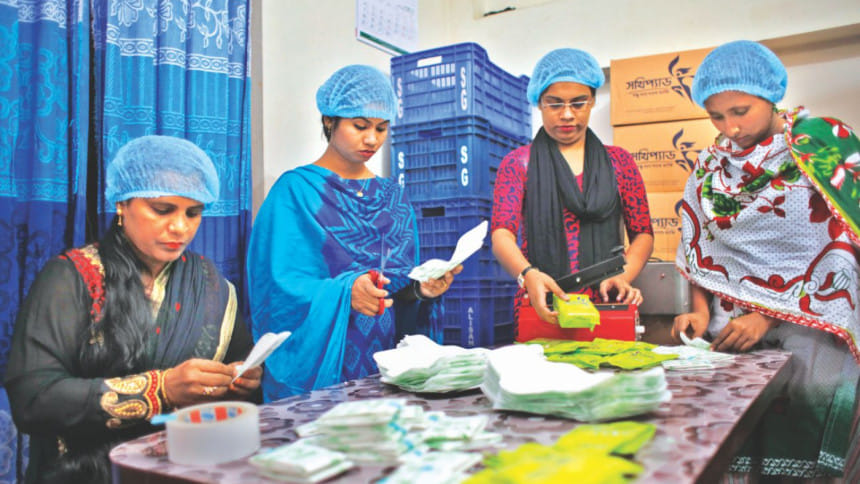A step forward for menstrual hygiene

Mansura Akhter Panna, 30, often recalls her dreadful days of menstruation when she entered puberty.
She recollects memories of cutting old rags into pieces, using and later washing them for reuse. The rags would be left to dry under her bunk so that nobody could see them.
“We were taught by older women to use the rags. Sanitary pads were available in the market, but we could not afford them,” Panna said.
A few years later, at the age of 20, Panna was diagnosed with a cyst in her urinary tract. Since then, she had wanted to stop using the unhygienic rags but poverty always came in the way. “Sanitary napkins are too pricey for many women with limited money,” she said.
Sokhipad, a social business venture with a vision to facilitate affordable and quality sanitary napkins among schoolgirls and working women at the lower tier in the society, is giving hope to the likes of Panna.
Some six months ago, Panna came across Sokhipad through two of her neighbours who worked for its factory in the capital's Ibrahimpur area. Panna joined Sokhipad as a worker, and soon started raising awareness of the importance of using sanitary napkins simultaneously with her work.
Following its commercial production in October last year, five schools in Dhaka's Rayerbazar and Hazaribagh areas have been buying and using the pads. Sokhipad also launched its operation in 14 districts outside Dhaka, where its agents, called “Sokhi Apa”, sell sanitary napkins door-to-door.
Sokhipad are sold door-to-door and in schools to save women and girls from the embarrassment of buying sanitary napkins from pharmacies or open shops, Panna said.
“Many women in our society think menstruation is a taboo, and asking a male shopkeeper for pads is embarrassing to them. To save themselves from this, women often use rags at homes which are unhealthy. If I deliver it to their doorstep, it would save them from the embarrassment and also encourage them to use it,” Panna told The Daily Star recently.
Each pack of Sokhipad costs Tk 65. In comparison, most of the popular sanitary napkins available in the market are priced at around Tk 120-150 per pack.
Some 700 volunteers of the organisation also encourage schoolgirls in impoverished areas to use sanitary products.
To keep women from the age-old practices and encourage them to use hygienic sanitary napkins, an awareness campaign is essential, said Ariful Forquan, chief operating officer and initiator of Sokhipad.
When the thought of affordable sanitary napkins for lower-income women first struck Ariful, he bought a pack of lower-end sanitary napkins for Tk 40, only to find it ineffective. A few months later, at a conference held by the Department for International Development (DFID), he spoke about the matter. The agency immediately took interest in his plan and gave him a grant to buy machinery for producing low-cost sanitary napkins.
In February last year, Ariful and his partner Kalam Ahmed began the pilot phase of the production.
Sokhipad uses super-absorbent polymer, so that the napkins can be used for long hours, Ariful said, adding that the pads are treated with ultra-violet ray to make them germ-free.
The primary target markets for the pads are schoolgirls of rural areas and garment workers, who do not use sanitary napkins.
Sharmin Akhter, an assistant teacher of Haji Abdul Awal Adarsha High School at Hazaribagh, said teachers were reluctant to talk about menstruation health to their students, though it is in the curriculum.
But after agents of Sokhipad came to the school in mid-April and spoke about its importance, students and teachers paid attention to it, and the school has been buying the pads for female students since then, she said.
The education ministry in 2015 instructed all schools to keep sanitary napkins for students at the schools. The circular also instructed female teachers to talk about menstrual health in schools.
According to Bangladesh National Hygiene Survey 2014, 86 percent of schoolgirls use rags during their periods. The study also shows girls on an average miss approximately three school days every menstrual cycle.
Prof Laila Arjumand Banu, president of Obstetrical and Gynecological Society of Bangladesh, said using dirty cloth during period can cause pelvic infection, pelvic inflammatory disease and sometimes tubal block, leading to infertility. Sanitary napkins can prevent all these diseases, she added.
Sumaiya Akter Shimu, a college student in Kafrul who works as an intern at Sokhipad, said she learned a lot about menstrual hygiene from the organisation.
“I want to form student groups at my college and make girls aware of the matter,” she added.
Asked about the plans of expansion, Ariful said, the organisation plans to circulate Sokhipad all across the country and is also considering manufacturing biodegradable and reusable napkins in the future.

 For all latest news, follow The Daily Star's Google News channel.
For all latest news, follow The Daily Star's Google News channel. 




Comments